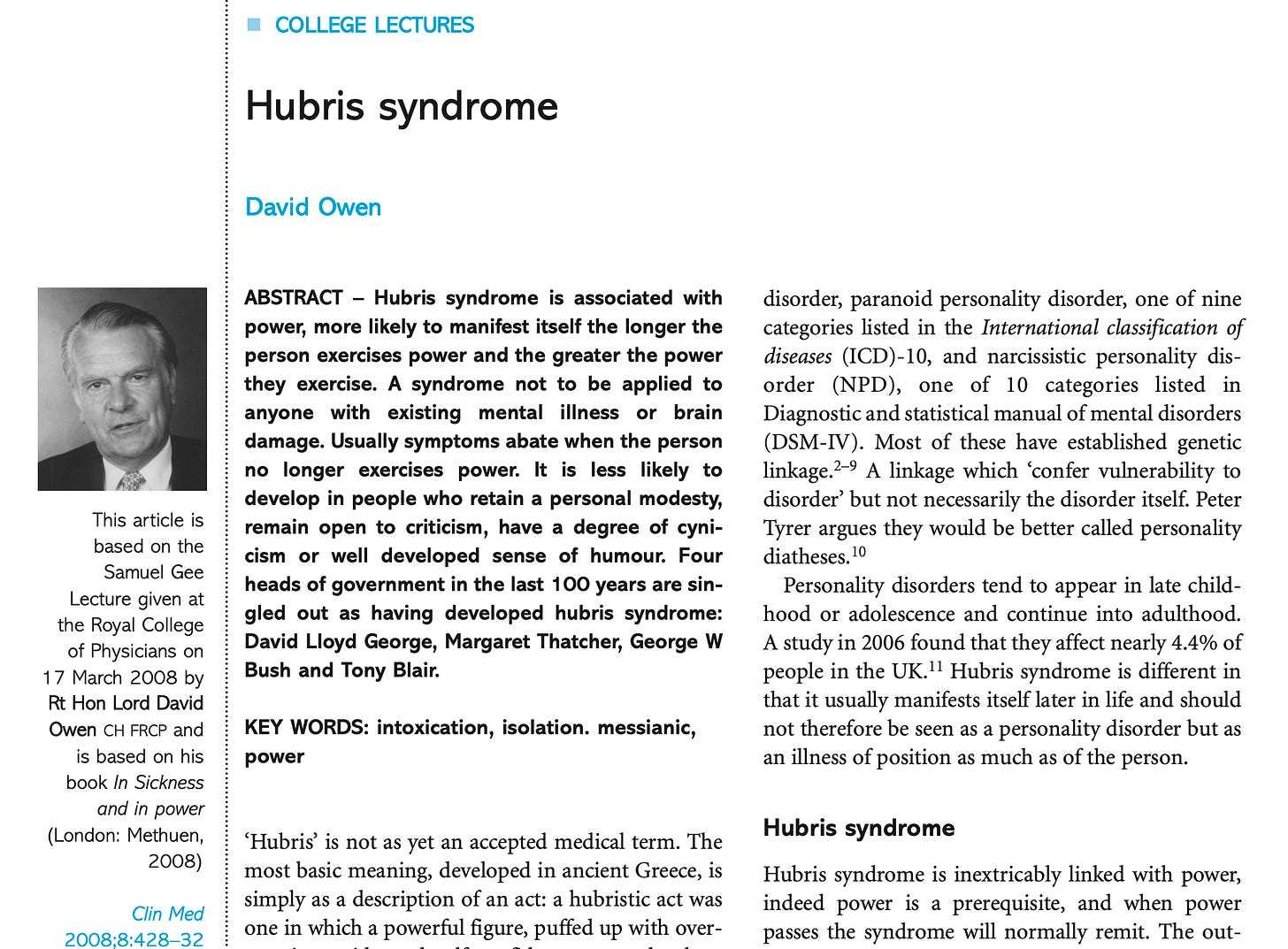Welcome to a new -and very important- edition of “Sebastian’s Leadership Reflections”, today we complete last week’s themes on ‘the stages of decline’ going deep on ‘the risk of overconfidence,’ represented by Hubris!
The word ‘hubris’ comes from the Greek and it means ‘inviting disaster,’ ‘arrogance’.
“Hubris Syndrome” is inextricably linked with power, and it represents the lurking danger -often unnoticed until it’s too late - of arrogance and overconfidence which can lead to catastrophic decision-making.
Drawing from ancient Greece, 'hubris' was once merely an act where powerful figures, filled with excessive pride, treated others with disdain. Fast forward to today, and this term has evolved into a ‘syndrome’ that's very relevant to understand for those in leadership roles. Nowadays, we draw on this concept to describe a dysfunctional behavior characterized by the feeling of omnipotence and excessive self-confidence.
But What is Hubris Syndrome?
Imagine leaders so consumed by their power that they believe they're infallible. They dismiss others, make decisions based on their own judgement and glory, and lose touch with reality. Hubris Syndrome is not just about being arrogant; it's about letting power distort your judgment, and it represents a real concern in today's leadership landscape. From politics to business, many leaders exhibit signs of this syndrome, the risks are real.
While 'hubris' isn't officially recognized as a medical term, some of its manifestations have similarities with certain mental health conditions, such as ADHD, bipolar disorder, and narcissistic personality disorder. However, Hubris Syndrome stands out because it typically emerges later in life when the individual is faced with power. It's not just about the person; it's about the position they hold.
Leaders with Hubris Syndrome often become isolated losing their grip on reality, even acting in reckless ways. They prioritize their image over practicality, become overly confident in their decisions, and dismiss any criticism. This isn't just about making poor choices; it's about refusing to accept that those choices could be flawed.
The author that coined this concept, David Owen, studied many political leaders over the past century showing how they displayed signs of Hubris Syndrome during their tenure, where some of their decisions and actions reflected a shift from their earlier leadership styles.
Hubris syndrome (link to original publication)
In a later review publication by Dr. Gerald Russel in ‘The Psychiatrist’ (2011), 35, 140-145 we can find this insightful paragraph:
“Lord Owen presented his ideas on the psychiatry of politicians at the 2008 General Meeting of the Royal College of Psychiatrists to a packed audience. Hitherto his work has been published in books and in general medical journals. This review is intended to make it available more directly to psychiatrists. David Owen has had a rich and varied career. He moved rapidly from medicine (including a significant psychiatric input) to the higher echelons of politics (parliamentarian, foreign secretary, Social Democratic Party leader and peace envoy to the former Yugoslavia). He became an influential, albeit controversial, political thinker. In writing on the medical aspects of prominent politicians’ behavior during the past 100 years he has approached his subject from a unique vantage point, combining the mindsets of clinician and politician.”
Psychiatry and politicians: the ‘hubris syndrome’ (link to review publication)
Why It's More Dangerous Than We Think
At its core, Hubris Syndrome is the intoxicating overconfidence seen in individuals in positions of power. They exhibit exaggerated self-belief, unyielding conviction in their decisions, and a blatant disregard for others' opinions. But this isn't just a stubborn attitude; it's a profound belief that their perspective is the only valid one.
Louis XIV named himself the Sun King; Bonaparte crowned himself emperor in 1804
In the corporate world, it is not rare to see people who have lost all grip on reality who nurture excessive self-confidence while believing that they control everything around them.
Leaders are decision-makers. Their choices can shape the fate of nations, corporations, teams, communities, and the life of individuals. Imagine a leader, under the influence of Hubris Syndrome, making unilateral decisions without consulting experts or considering the broader implications. The potential for harm is immense.
Research on the subject draws a concerning parallel between Hubris Syndrome and an "acquired personality disorder." This suggests that the very nature of holding power can alter one's behavior, making leaders more susceptible to this syndrome over time.
Addressing Hubris for Better Leadership
When it comes to leadership challenges, Hubris Syndrome stands out as both unique and dangerous. It's not just about making poor decisions; it's about refusing to accept that those decisions could be flawed.
For effective leadership, recognizing the signs of Hubris Syndrome is just the first step. Leaders must actively seek feedback, encourage dissenting opinions, and, most importantly, be willing to change course when needed. Only by doing so can they truly serve the greater good and avoid the pitfalls of unchecked power.
Hubris Syndrome is a leadership challenge, but with awareness, reflection, and a commitment to growth, leaders can manage their power responsibly and effectively.
"The measure of a man is what he does with power."
Plato
Plato's words resonate profoundly in this context and isn't just a philosophical reflection; it's a call to action. Leaders must constantly evaluate how they're wielding their power. Are they listening, reflecting, and adapting? Or are they succumbing to the danger of Hubris Syndrome?
How to avoid it? Self-Awareness and Humility:
Retain personal modesty, keep it humble
Consult widely, listen to opposing views and value feedback.
Respect the process of checks and balances.
Surround yourself with confidants who aren't afraid to critique.
The Way Forward
As we navigate our own leadership journeys, remain close to the people on the ground and let's stay vigilant to our behaviors and judgement calls.
Hubris Syndrome is more than just an idea; it's a call to action. Any good leader must respect people, self-reflect and ensure they are always serving the greater good, not just their own egos. It’s their actions that talk, not their words, and it’s a moral obligation to treat people with respect.
- Daedalus “Let me warn you, Icarus, to take the middle way, in case the moisture weighs down your wings, if you fly too low, or if you go too high, the sun scorches them.”
Icarus gained the power of flight thanks to wings of feathers and wax made by his father Daedalus. However he did not listen to his father and flew too close to the sun, his wings melted, and he fell to his death into the ocean.
P.S. Before I go, here you have “The Treat,” where I share some of the music that kept me company while writing … Enjoy as you bid farewell to this post
“Lead yourself, Learn to live. Lead others, Learn to Build.”
If you enjoyed reading this post consider subscribing to the newsletter for free, joining the community and sharing your thoughts.








Sebastian, your article inspired me to take a moment of introspection. Great topic for all leaders in positions of power to evaluate just how they are leading and the impact they make on their team. Thank you!